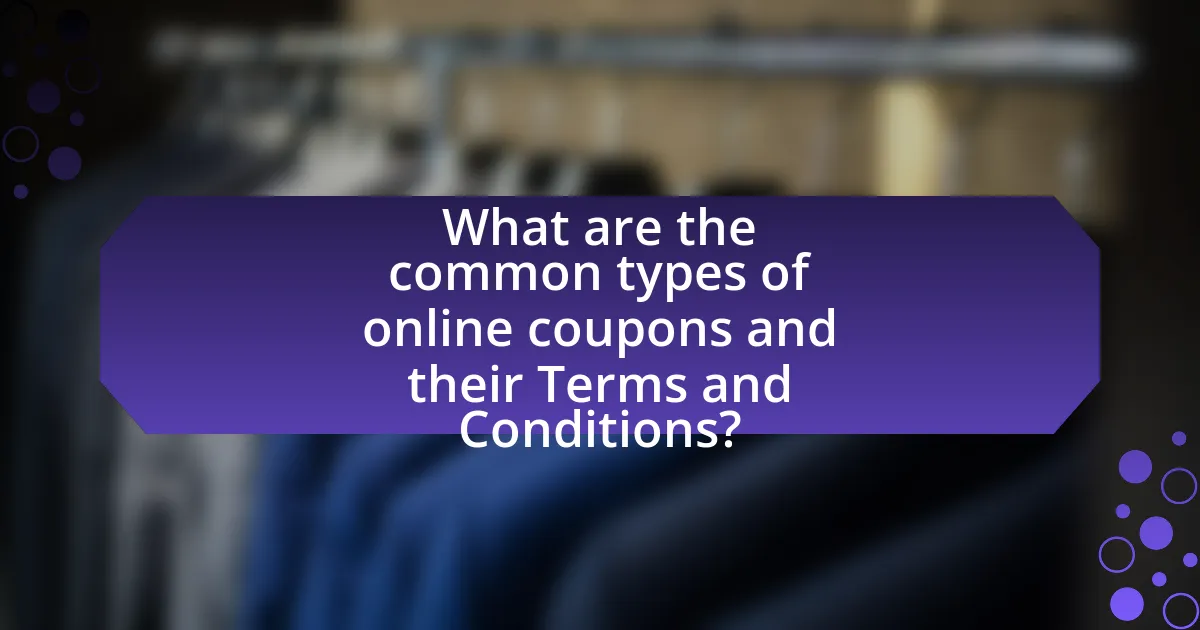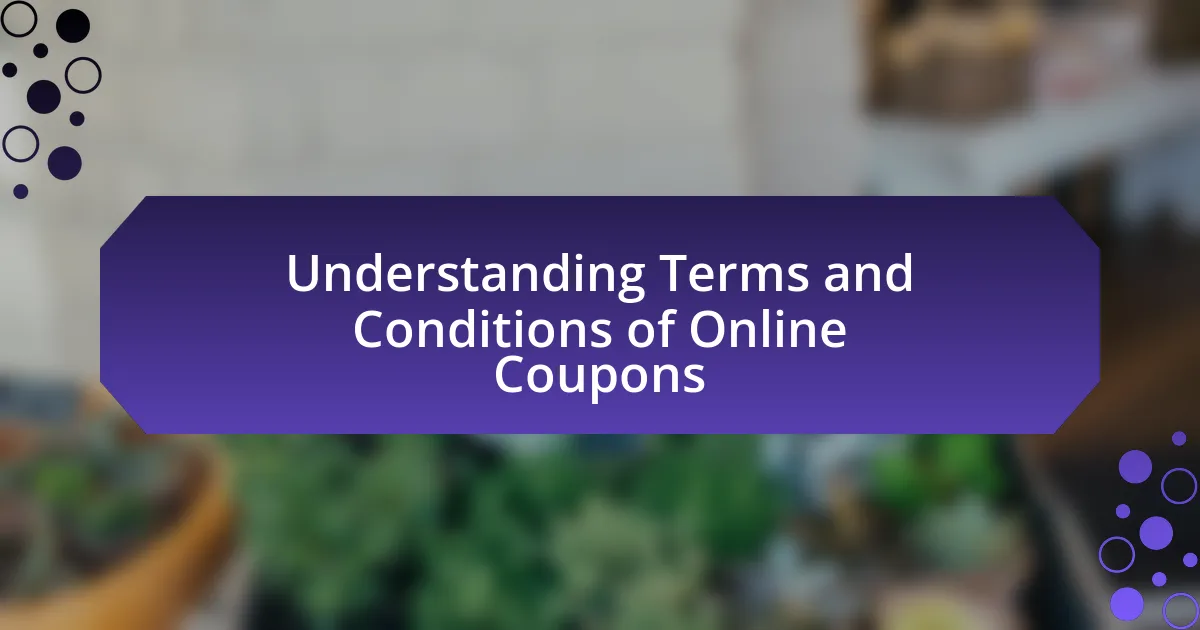The article focuses on the Terms and Conditions of online coupons, detailing the rules that govern their use, including expiration dates, usage limits, and applicable products. It emphasizes the importance of these terms for both consumers and businesses, highlighting their role in reducing disputes and protecting legal rights. Key components of Terms and Conditions, common restrictions, and the implications of using expired or invalid coupons are discussed. Additionally, the article explores how regional laws and the type of product influence these terms, providing best practices for users to maximize their savings while adhering to the established guidelines.

What are the Terms and Conditions of Online Coupons?
The Terms and Conditions of Online Coupons typically outline the rules governing the use of the coupons, including expiration dates, usage limits, and applicable products or services. These terms specify that coupons may only be used once per customer, cannot be combined with other offers, and may require a minimum purchase amount. Additionally, they often state that the issuer reserves the right to modify or cancel the coupon at any time, and that misuse of the coupon can result in disqualification from the offer. Such conditions ensure clarity and fairness in the promotional process, protecting both the consumer and the business.
Why are Terms and Conditions important for online coupons?
Terms and Conditions are important for online coupons because they establish the rules and guidelines governing the use of the coupons. These terms clarify eligibility, expiration dates, usage limits, and restrictions, ensuring that both consumers and businesses understand their rights and obligations. For instance, a study by the Consumer Federation of America highlights that clear terms can reduce disputes between customers and retailers, as they provide a framework for acceptable use. Additionally, they protect businesses from potential legal issues by outlining the conditions under which the coupons can be redeemed, thereby minimizing the risk of fraud and misuse.
What legal implications do Terms and Conditions have for users?
Terms and Conditions (T&C) create a legally binding agreement between users and service providers, outlining the rights and responsibilities of both parties. Users are typically required to adhere to the stipulations set forth in the T&C, which may include limitations on liability, dispute resolution procedures, and conditions for use. Failure to comply with these terms can result in consequences such as account suspension, loss of access to services, or legal action. For instance, a user who violates the T&C of an online coupon service may forfeit their ability to redeem future offers or face legal repercussions for misuse.
How do Terms and Conditions protect businesses offering coupons?
Terms and Conditions protect businesses offering coupons by clearly outlining the rules and limitations associated with the use of those coupons. These legal documents establish the rights and responsibilities of both the business and the consumer, thereby minimizing the risk of disputes. For instance, they can specify expiration dates, usage limits, and restrictions on combining offers, which helps prevent misuse and abuse of the coupons. Additionally, Terms and Conditions can include disclaimers that limit liability for the business in case of errors or misunderstandings regarding the coupon’s terms. By having these provisions in place, businesses can safeguard their interests and maintain control over promotional strategies, ensuring that the intended benefits of the coupons are realized without unintended consequences.
What key components are typically included in Terms and Conditions?
Key components typically included in Terms and Conditions are definitions, user obligations, limitations of liability, dispute resolution, and governing law. Definitions clarify key terms used throughout the document, ensuring users understand the context. User obligations outline the responsibilities and acceptable behaviors expected from users when utilizing the service or product. Limitations of liability specify the extent to which the provider is responsible for issues that may arise, protecting them from excessive claims. Dispute resolution details the process for resolving conflicts, often including arbitration clauses. Governing law indicates which jurisdiction’s laws will apply to the agreement, providing clarity on legal matters. These components are essential for establishing clear expectations and legal protections for both parties involved.
What restrictions are commonly found in online coupon Terms and Conditions?
Common restrictions found in online coupon Terms and Conditions include expiration dates, limitations on usage per transaction, and exclusions on specific products or categories. Expiration dates dictate the timeframe within which the coupon must be used, often ranging from a few days to several months. Limitations on usage typically state that a coupon can only be applied once per customer or per order, preventing multiple uses. Exclusions often specify that certain items, such as sale items or clearance products, are not eligible for discounts, ensuring that the coupon applies only to full-priced merchandise. These restrictions are designed to manage the promotion’s effectiveness and prevent abuse.
How do expiration dates affect the usability of online coupons?
Expiration dates significantly limit the usability of online coupons by defining the timeframe within which they can be redeemed. Once a coupon reaches its expiration date, it becomes invalid, preventing consumers from utilizing the discount or offer. According to a study by the National Retail Federation, 60% of consumers reported that they have missed using a coupon due to expiration, highlighting the impact of these dates on consumer behavior and savings potential. Therefore, expiration dates serve as a critical factor in determining whether a coupon can be effectively used, influencing both consumer purchasing decisions and retailer promotional strategies.
How can users effectively understand and navigate Terms and Conditions?
Users can effectively understand and navigate Terms and Conditions by breaking down the document into manageable sections and focusing on key elements such as definitions, obligations, and limitations. This approach allows users to identify important clauses that may affect their rights and responsibilities. For instance, highlighting sections that outline the expiration dates, usage restrictions, and refund policies can clarify how online coupons function. Research indicates that users who actively engage with the text, such as by summarizing each section or asking questions about unclear terms, are more likely to comprehend the content fully. Additionally, utilizing tools like glossaries or FAQs provided by companies can enhance understanding by offering explanations of complex legal jargon.
What strategies can users employ to read and comprehend Terms and Conditions?
Users can employ several strategies to effectively read and comprehend Terms and Conditions. First, breaking down the document into sections allows users to focus on one part at a time, making complex language more manageable. Second, highlighting or taking notes on key points helps users retain important information and clarify their understanding. Third, using online tools or glossaries to define unfamiliar terms can enhance comprehension, as many Terms and Conditions contain legal jargon. Additionally, seeking summaries or reviews from reliable sources can provide context and highlight critical aspects without needing to read the entire document. These strategies are supported by research indicating that active engagement with text improves understanding and retention.
How can users identify potential red flags in Terms and Conditions?
Users can identify potential red flags in Terms and Conditions by closely examining clauses that limit their rights or impose unfair obligations. Key indicators include vague language, excessive liability disclaimers, automatic renewals, and arbitration clauses that restrict legal recourse. For instance, a study by the Consumer Financial Protection Bureau found that 70% of consumers do not read Terms and Conditions, leading to unawareness of hidden fees or unfavorable terms. Therefore, users should actively look for these elements to protect themselves from unfavorable agreements.

What are the common types of online coupons and their Terms and Conditions?
Common types of online coupons include percentage-off coupons, dollar-off coupons, free shipping coupons, and buy-one-get-one (BOGO) offers. Each type has specific Terms and Conditions that typically outline usage limits, expiration dates, applicable products or categories, and restrictions on combining with other offers. For instance, percentage-off coupons may only apply to full-priced items and often exclude clearance items, while free shipping coupons might require a minimum purchase amount. Understanding these terms is crucial for consumers to maximize their savings effectively.
How do promotional codes differ from cashback offers in terms of Terms and Conditions?
Promotional codes and cashback offers differ significantly in their Terms and Conditions. Promotional codes typically require users to enter a specific code at checkout to receive a discount on their purchase, often with conditions such as minimum purchase amounts or restrictions on certain products. In contrast, cashback offers usually involve a percentage of the purchase price being returned to the customer after the transaction, often requiring registration or participation in a loyalty program, and may have limitations on eligible products or timeframes for claiming the cashback. For instance, a promotional code might state that it is valid only for first-time customers, while a cashback offer might specify that it is only applicable to purchases made within a promotional period.
What specific Terms and Conditions apply to promotional codes?
Promotional codes are subject to specific Terms and Conditions that typically include expiration dates, usage limits, and restrictions on eligible products or services. For instance, many promotional codes may only be valid for a limited time, often specified in the promotional material, and can be restricted to certain categories of items or minimum purchase amounts. Additionally, some codes may only be applicable to new customers or may not be combinable with other offers. These conditions ensure that the promotional codes are used as intended and help maintain the integrity of the promotional strategy.
What unique aspects should users consider for cashback offers?
Users should consider the specific terms and conditions associated with cashback offers, as these can significantly impact the actual benefits received. Key aspects include the cashback percentage, eligibility criteria, expiration dates, and any minimum purchase requirements. For instance, some offers may only apply to select products or categories, while others might require users to make a purchase within a certain timeframe to qualify for the cashback. Additionally, users should be aware of the method of cashback redemption, whether it is credited directly to their account, issued as a check, or provided as store credit. Understanding these details ensures users maximize their savings and avoid potential pitfalls associated with cashback offers.
What are the implications of using expired or invalid coupons?
Using expired or invalid coupons typically results in the denial of the discount at the point of sale. Retailers often enforce strict policies regarding coupon validity, meaning that customers cannot redeem these coupons for savings. According to a survey by the National Retail Federation, approximately 60% of retailers do not accept expired coupons, emphasizing the importance of checking expiration dates before attempting to use them. Additionally, attempting to use invalid coupons can lead to customer frustration and a negative shopping experience, as well as potential embarrassment at checkout.
What recourse do users have if a coupon is not honored?
Users can contact customer service for recourse if a coupon is not honored. This action allows users to explain the situation and seek resolution, which may include honoring the coupon or providing an alternative discount. Additionally, users can review the terms and conditions associated with the coupon, as these documents often outline specific limitations or exclusions that may affect its validity. If customer service does not resolve the issue, users may escalate the matter through formal complaints to consumer protection agencies, which can investigate unfair business practices.
How can users avoid issues with expired coupons in the future?
Users can avoid issues with expired coupons in the future by regularly checking the expiration dates before attempting to use them. This proactive approach ensures that users are aware of the validity period of their coupons, which is often specified in the terms and conditions provided by retailers. According to a survey by RetailMeNot, 60% of consumers reported losing out on savings due to expired coupons, highlighting the importance of vigilance in coupon management. By setting reminders or using digital wallets that track expiration dates, users can effectively manage their coupons and maximize their savings.

How do Terms and Conditions of online coupons vary across platforms?
Terms and Conditions of online coupons vary significantly across platforms in aspects such as expiration dates, usage limits, and eligibility criteria. For instance, some platforms may impose a single-use limit per customer, while others allow multiple uses. Additionally, expiration dates can range from a few days to several months, depending on the promotional strategy of the platform. Furthermore, eligibility criteria may differ; certain coupons may only apply to specific products or categories, while others are more broadly applicable. These variations are often outlined in the fine print of each platform’s terms, reflecting their unique marketing approaches and business models.
What factors influence the variation in Terms and Conditions among different retailers?
The variation in Terms and Conditions among different retailers is influenced by factors such as business model, target audience, legal requirements, and competitive strategy. Retailers with different business models, such as subscription services versus one-time purchases, will tailor their Terms and Conditions to reflect their operational needs and customer expectations. For instance, subscription services may include clauses related to recurring payments and cancellation policies, while one-time purchase retailers focus on return policies and warranty information.
Target audience also plays a crucial role; retailers targeting younger consumers may adopt more flexible and user-friendly terms to enhance customer experience, while those targeting businesses may include more stringent legal language. Legal requirements vary by jurisdiction, compelling retailers to adapt their Terms and Conditions to comply with local laws, such as consumer protection regulations. Lastly, competitive strategy influences how retailers position themselves in the market; for example, a retailer aiming to attract price-sensitive customers may offer more lenient return policies, while a luxury retailer may emphasize exclusivity and stricter terms.
How do regional laws affect the Terms and Conditions of online coupons?
Regional laws significantly influence the Terms and Conditions of online coupons by establishing legal requirements that businesses must comply with in different jurisdictions. For instance, laws regarding consumer protection, advertising standards, and data privacy vary across regions, necessitating that companies tailor their coupon terms to meet these specific legal obligations. In the United States, for example, the Federal Trade Commission enforces regulations that require clear disclosure of terms, while the European Union mandates compliance with the General Data Protection Regulation, affecting how personal data is handled in coupon promotions. These legal frameworks ensure that consumers are adequately informed and protected, thereby shaping the language and stipulations included in the Terms and Conditions of online coupons.
What role does the type of product or service play in shaping Terms and Conditions?
The type of product or service significantly influences the Terms and Conditions by dictating specific legal requirements, usage guidelines, and consumer protections. For instance, digital products often include clauses related to software licensing, while physical goods may emphasize return policies and warranty information. Additionally, services like subscription models necessitate clear cancellation terms and payment structures. These variations ensure compliance with relevant regulations, such as consumer protection laws, which differ based on the nature of the product or service being offered.
What are the best practices for users when dealing with Terms and Conditions?
Users should carefully read and understand the Terms and Conditions before accepting them. This practice ensures that users are aware of their rights, obligations, and any potential limitations associated with the use of online coupons. For instance, many Terms and Conditions include expiration dates, usage limits, and restrictions on combining offers, which can significantly impact the value of the coupon. Additionally, users should look for any clauses related to data privacy and dispute resolution, as these can affect their personal information and how conflicts are handled. By being diligent in reviewing these documents, users can make informed decisions and avoid unexpected issues when redeeming online coupons.
How can users ensure they are making informed decisions when using online coupons?
Users can ensure they are making informed decisions when using online coupons by thoroughly reading the terms and conditions associated with each coupon. Understanding these terms helps users identify restrictions, expiration dates, and specific requirements for usage, which can significantly affect the value of the coupon. For instance, a study by the National Retail Federation found that 90% of consumers who read the terms and conditions reported a better understanding of how to effectively use coupons, leading to more savings and fewer frustrations.
What tips can help users maximize their savings while adhering to Terms and Conditions?
To maximize savings while adhering to Terms and Conditions, users should carefully read and understand the specific requirements of each coupon or offer. This includes checking expiration dates, minimum purchase amounts, and any restrictions on eligible products. For instance, a study by the National Retail Federation found that 68% of consumers do not fully understand the terms of the coupons they use, which can lead to missed savings opportunities. By ensuring compliance with these terms, users can effectively utilize discounts and avoid penalties, thereby enhancing their overall savings experience.



